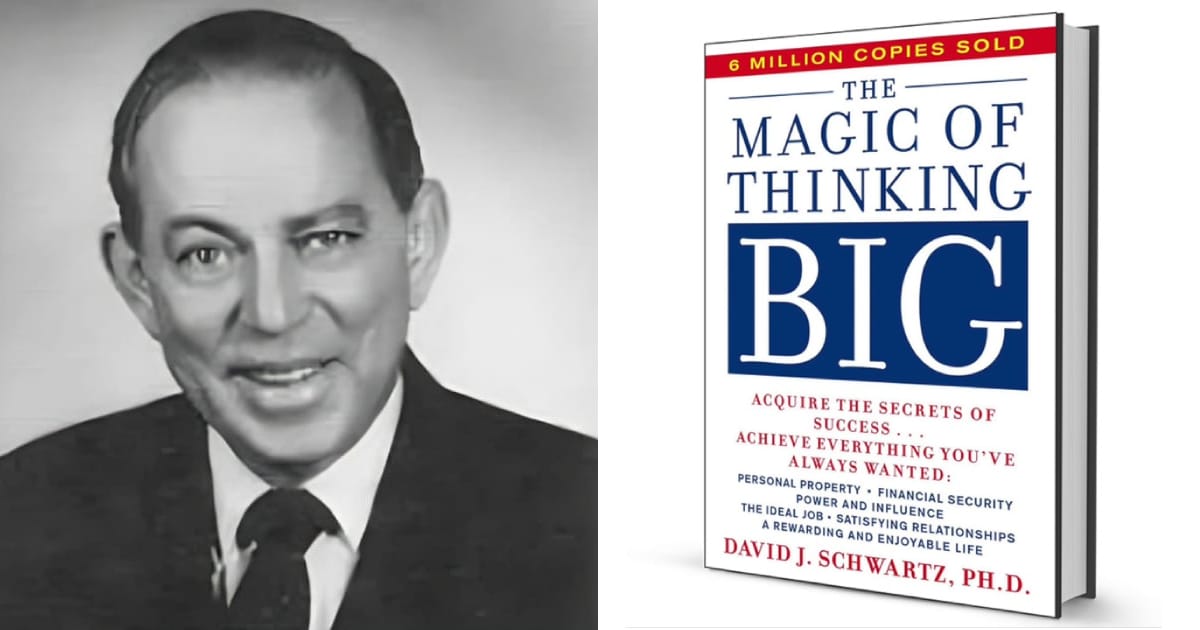Beyond Impossible: 'The Magic of Thinking Big'

Personal and professional success is constantly evolving, the timeless wisdom encapsulated in "The Magic of Thinking Big" by David J. Schwartz offers invaluable insights into achieving one's fullest potential.
First published in 1959, this seminal work has not only stood the test of time but has also become a cornerstone of motivational literature, inspiring millions to expand the scope of their ambitions and to embrace the limitless possibilities of positive thinking.
David J. Schwartz, Ph.D., was a renowned American motivational author and coach, known for his expertise in leadership, sales management, and personal development. His teachings emphasize the transformative power of belief and the pivotal role that an individual's mindset plays in determining their success.
Schwartz's philosophy is built on the premise that big achievements start with big thinking; he posits that the size of one's success is directly proportional to the size of their thoughts.
This foundational belief is what makes "The Magic of Thinking Big" not merely a book, but a blueprint for a way of thinking that transcends conventional limitations.
The book presents a compelling argument for why we should dare to aim beyond the ordinary, urging readers to break free from self-imposed constraints and societal expectations. Schwartz skillfully illustrates how a shift in mindset, from average to ambitious, from fear-driven to faith-driven, can dramatically alter one's trajectory in life. By combining practical advice with relatable examples, he guides readers through the process of cultivating a big-thinking mindset that paves the way for unparalleled success.
This introduction lays the groundwork for a deep dive into the core tenets of Schwartz's philosophy, exploring the various dimensions of thinking big and its applicability in today's world. As we start this journey, we invite readers to open their minds to the principles that have empowered countless individuals to achieve their dreams, demonstrating that with the right mindset, there are truly no limits to what can be accomplished.
Summary of the Book

"The Magic of Thinking Big" by David J. Schwartz is more than a self-help book; it's a manifesto for personal excellence and a comprehensive guide to living a life marked by greater achievements and fulfillment. Through its chapters, Schwartz unfolds the blueprint for expanding one's mind and life through the power of positive thinking. Here, we delve into the essence of the book, summarizing its key themes and the wisdom it imparts.
Believe You Can Succeed and You Will
Schwartz starts by tackling the foundation of all success: belief. He asserts that belief in success is the one basic, absolutely essential ingredient of successful people. Belief triggers the power to do. By instilling a deep, unshakable belief in one's own capabilities, Schwartz argues, individuals can overcome obstacles, turn around seemingly hopeless situations, and blaze a trail to success.
"Believe it can be done. When you believe something can be done, your mind will find the ways to do it. Believing a solution paves the way to solution." - David Schwartz
Cure Yourself of Excusitis, the Failure Disease
This chapter addresses what Schwartz calls "excusitis," or the habit of making excuses for one's failures. Whether it's health, intelligence, age, or luck, Schwartz dismantles common excuses and demonstrates how to overcome these mental barriers. He emphasizes the importance of focusing on one's strengths rather than weaknesses, fostering a healthier, more productive mindset.
Build Confidence and Destroy Fear
Fear is identified as a major deterrent to taking action and achieving success. Schwartz provides practical strategies for overcoming fear, such as understanding the common fears of failure and embarrassment, and offers techniques for building confidence through action and experience.
“Do what you fear and fear disappears.” - David Schwartz
How to Think Big
Here, Schwartz elaborates on the core message of the book: the importance of thinking big. He offers insights into how thinking big influences outcomes, advising readers to visualize success, avoid selling themselves short, and cultivate a habit of dreaming big dreams. Thinking big, according to Schwartz, transforms one's approach to challenges and opportunities, leading to greater achievements.
Think and Dream Creatively
Creativity is not a talent reserved for a select few, but a skill that can be developed. Schwartz encourages readers to break free from conventional thinking patterns and embrace innovative solutions. He suggests practices such as open-mindedness, curiosity, and the willingness to try new approaches as ways to enhance one's creative powers.
"Creative thinking is simply finding new, improved ways to do anything" - David Schwartz
You Are What You Think You Are
Schwartz discusses the concept of self-image and its profound impact on one's life. He argues that how individuals see themselves directly influences their behavior and, by extension, their success in life. By fostering a positive self-image and acting in a manner consistent with this image, people can improve their interactions and achieve more.
"The tendency for so many people to think small means there is much less competition than you think for a very rewarding career" - David Schwartz
Manage Your Environment: Go First Class
The environment, including the people with whom one associates, plays a significant role in shaping mindset and attitudes. Schwartz advises choosing a positive environment that supports growth and success, emphasizing the importance of surrounding oneself with people who encourage and inspire big thinking.
Make Your Attitudes Your Allies
In this chapter, Schwartz highlights the role of positive attitudes in achieving success. He offers guidance on how to cultivate attitudes that will propel one forward, such as enthusiasm, sincerity, and a constructive approach to challenges.
Think Right Toward People
Success is not just about personal achievements, but also about building positive relationships. Schwartz outlines principles for effective interpersonal communication and emphasizes the importance of respect, understanding, and empathy in fostering strong, supportive relationships.
Get the Action Habit
Schwartz concludes with a call to action, reminding readers that success is not just about thinking, but doing. He champions the "action habit" as essential for turning ideas into reality, urging readers to take decisive steps toward their goals, even in the face of uncertainty or fear.
“Action cures fear. Indecision, postponement, on the other hand, fuel fear.” - David Schwartz
Through these chapters, "The Magic of Thinking Big" provides a comprehensive framework for personal and professional growth. Each theme weaves into the next, creating a tapestry of strategies designed to elevate one's life by elevating one's thoughts. As we move forward, we'll explore the application of these core concepts, illustrating how they can be practically implemented to foster success and fulfillment in various aspects of life.
The Core Concepts

The book offers a treasure trove of strategies to transform one’s life through the power of positive thinking. This section explores the application of the book's core concepts, demonstrating how they can be integrated into daily life to foster success and personal growth.
Belief in Oneself: The Starting Point of Success
The concept of self-belief is central to Schwartz's philosophy. He posits that success begins in the mind, with the conviction that one can achieve their goals. This belief acts as the fuel for ambition, driving individuals to pursue their dreams with confidence. To cultivate such belief, Schwartz suggests practices like visualization of success, affirming one’s capabilities through positive self-talk, and setting achievable goals that build confidence over time. By internalizing the belief that success is possible, individuals can overcome challenges and take decisive steps toward their aspirations.
"The size of your success is determined by the size of your belief" - David Schwartz
Turning Defeat into Victory: Learning from Setbacks
Schwartz emphasizes the importance of resilience, encouraging readers to view setbacks not as insurmountable obstacles but as opportunities for growth. He advocates for a constructive approach to failure, suggesting that each setback provides valuable lessons that can pave the way to future successes. To apply this concept, individuals should analyze failures to understand what went wrong, extract lessons, and adjust their strategies accordingly. Embracing a mindset that welcomes challenges as learning experiences can transform the way one perceives and responds to adversity.
Using Goals to Help You Grow
Goals are the milestones of success in Schwartz's framework. He recommends setting clear, ambitious goals as a way to direct one's focus and efforts. To effectively use goals for growth, it is essential to break them down into smaller, manageable tasks, creating a roadmap toward achievement. Regularly reviewing and adjusting goals ensures they remain aligned with one’s aspirations and capabilities. By treating goals as stepping stones, individuals can maintain motivation and navigate the path to success with clarity and purpose.
“Think little goals and expect little achievements. Think big goals and win big success.” - David Schwartz
The Importance of Action: Moving from Ideas to Implementation
Schwartz’s call for the “action habit” underscores the necessity of translating thought into action. Ideas, no matter how big, only realize their potential through execution. To foster this habit, Schwartz suggests starting with small actions to build momentum, overcoming procrastination by focusing on the benefits of task completion, and adopting a “do it now” mentality. Emphasizing action over perfection, he encourages individuals to take initiative, learn from the outcomes, and refine their approach as they progress.
Handling Fear and Uncertainty
Fear and uncertainty are common barriers to thinking and acting big. Schwartz offers strategies to manage these feelings, such as facing fears directly, preparing thoroughly to reduce uncertainty, and leveraging fear as a motivator rather than a hindrance. Practicing courage in small situations builds the confidence to tackle larger challenges. Moreover, embracing uncertainty as a part of the growth process can transform it from a source of anxiety into a catalyst for exploration and innovation.
How to Implement the Core Concepts

Implementing the principles from "The Magic of Thinking Big" can profoundly impact one's personal and professional life. Here are practical tips to incorporate these transformative ideas into daily practices, fostering a mindset that propels you toward greater success and fulfillment.
1) Cultivate a Positive Mindset
- Practice Positive Self-Talk: Start your day with affirmations that reinforce your ability to handle challenges and achieve your goals. Replace negative thoughts with positive ones to build self-confidence and maintain focus on your aspirations.
- Visualize Success: Spend a few minutes each day visualizing achieving your goals. Imagine the feeling of success and the steps you took to get there. This visualization reinforces belief in your potential and motivates you to pursue your dreams.
2) Set and Pursue Ambitious Goals
- Define Clear, Achievable Goals: Break down your big dreams into specific, measurable, achievable, relevant, and time-bound (SMART) goals. This makes the process of achieving them more manageable and less overwhelming.
- Create Action Plans: For each goal, develop a detailed action plan outlining the steps needed to achieve it. Regularly review and adjust your plans to stay on track and adapt to any changes.
3) Overcome Fear and Embrace Challenges
- Face Fears Directly: Identify your fears and confront them head-on. Challenge yourself to step out of your comfort zone regularly, whether it's public speaking, starting a new project, or learning a new skill.
- Learn from Failure: View failures as learning opportunities. Analyze what went wrong, adjust your approach, and try again. Remember, resilience is key to overcoming obstacles and moving forward.
4) Build a Supportive Environment
- Surround Yourself with Positive Influences: Choose to spend time with people who inspire you, support your goals, and encourage you to think bigger. A supportive network can provide motivation, advice, and valuable feedback.
- Seek Mentors and Role Models: Identify individuals who embody the success and mindset you aspire to achieve. Reach out for mentorship or simply study their habits, strategies, and attitudes to guide your own journey.
5) Take Consistent Action
- Develop the "Action Habit": Cultivate a bias towards action by taking small, consistent steps toward your goals every day. Break tasks into manageable pieces and celebrate small victories to maintain momentum.
- Overcome Procrastination: Set deadlines for yourself, and use time management techniques such as the Pomodoro Technique or time blocking to keep yourself accountable and focused on your tasks.
6) Maintain a Big-Thinking Attitude
- Reflect Regularly: Set aside time each week to reflect on your progress, reassess your goals, and adjust your strategies as needed. Reflection helps maintain a big-picture perspective and ensures you're aligned with your aspirations.
- Stay Open to Learning: Adopt a mindset of continuous improvement. Seek out new knowledge, skills, and experiences that can expand your perspective and enhance your ability to think and act big.
Real-Life Success Stories Inspired by the Book

Schwartz has left a lasting impact on countless individuals, inspiring them to overcome limitations and achieve remarkable success. This section highlights real-life success stories of people who have applied Schwartz's principles, demonstrating the transformative power of thinking big.
Entrepreneurial Success through Positive Belief
John, a small-town software developer, dreamed of starting his own tech company but faced skepticism from those around him. Inspired by Schwartz’s emphasis on belief in oneself, John adopted a mindset of unwavering confidence in his vision. He visualized his success, set ambitious goals, and persistently worked towards them. Despite initial setbacks, his belief in his capability and his project's potential drove him to continue. Today, John's company is a leading innovator in its field, exemplifying how a strong belief in oneself, combined with the action habit, can turn dreams into reality.
Overcoming Adversity with Resilience
Emily, a professional athlete, encountered a career-threatening injury that left her future uncertain. Schwartz's teachings on turning defeat into victory resonated with her. Instead of succumbing to despair, Emily viewed her recovery as a challenge to overcome. She set incremental goals for her rehabilitation, focusing on what she could do each day to improve. Her resilience and positive mindset not only led to a successful return to her sport but also to her best performance levels yet. Emily's story is a testament to the power of a positive attitude and resilience in the face of adversity.
Career Advancement through the Power of Networking
Alex, an aspiring writer, struggled to get his work published. He realized the importance of Schwartz's advice on managing one's environment and making attitudes one's allies. Alex began to attend writing workshops, network with established authors, and contribute to writing communities. This proactive approach expanded his professional network, leading to mentorship opportunities and eventually, the publication of his first book. Alex's journey underscores the significance of building positive relationships and environments that support one's goals.
Transforming Organizations with Big Thinking
Sarah, a CEO of a struggling non-profit, applied the principles of "The Magic of Thinking Big" to revitalize her organization. She encouraged her team to think creatively, set ambitious goals for the organization, and foster a culture of positivity and innovation. By believing in the potential of her team and the organization, Sarah led a remarkable turnaround, expanding the non-profit's impact and securing its financial sustainability. This story highlights how big thinking can transform not only individuals but entire organizations.
Key Takeaways from Success Stories
These stories illuminate several key takeaways from Schwartz's book:
- Belief in Possibility: The foundation of success is believing in one's potential and in the possibility of achieving one's goals, regardless of the current circumstances.
- Resilience in Adversity: Viewing challenges as opportunities for growth and learning can turn setbacks into stepping stones toward success.
- Proactivity and Networking: Active engagement with one's goals and the cultivation of supportive networks can accelerate progress and open new opportunities.
- Transformative Leadership: Big thinking can inspire collective action, leading to significant changes within organizations and communities.
These real-life examples demonstrate the practical applicability of the principles outlined in "The Magic of Thinking Big." By adopting a mindset of growth, resilience, and action, individuals can achieve their dreams and influence positive change around them.
The Lasting Impact of "The Magic of Thinking Big"

Since its publication in 1959, "The Magic of Thinking Big" by David J. Schwartz has remained a seminal work in the field of self-help and personal development. Its principles have not only stood the test of time but have also become foundational to the way individuals approach success, goal setting, and personal growth. This section reflects on the book's enduring relevance, its influence on modern self-help literature, and the importance of maintaining a big-thinking mindset in today's fast-paced and ever-changing world.
Timeless Relevance
The core message of "The Magic of Thinking Big"—that belief in oneself and the courage to set and pursue ambitious goals can lead to extraordinary achievements—resonates just as powerfully today as it did over six decades ago. In an era where change is constant and the scope for innovation and progress seems limitless, Schwartz's teachings encourage individuals to dream big and harness the power of positive thinking to navigate the complexities of modern life.
Influence on Modern Self-Help Literature
Schwartz's work has paved the way for a plethora of self-help books that explore similar themes of mindset, motivation, and personal transformation. Many contemporary authors cite "The Magic of Thinking Big" as a critical influence on their work, highlighting its role in shaping the self-help genre. The book's emphasis on actionable advice, grounded in psychological principles and real-world applications, has set a standard for how self-help literature can provide practical guidance and inspire meaningful change.
The Importance of a Big-Thinking Mindset
In today's world, characterized by rapid technological advancements, global connectivity, and complex challenges, the ability to think big is more crucial than ever. Individuals are faced with opportunities and obstacles that require innovative solutions, resilience, and a forward-thinking approach. Adopting a big-thinking mindset not only helps in achieving personal and professional goals but also contributes to addressing broader societal issues.
Schwartz's principles encourage individuals to see beyond the immediate horizon, to envision what could be rather than what is. This mindset fosters creativity, encourages risk-taking, and promotes a culture of perseverance and excellence. By believing in the possibility of change and taking proactive steps toward it, individuals can make significant contributions to their communities and the world at large.
Final Thoughts
"The Magic of Thinking Big" continues to inspire readers to transcend their limitations and aspire for greatness. Its lessons remind us that the barriers to success are often self-imposed and that by changing our mindset, we can change our lives. As we navigate the challenges and opportunities of the 21st century, the principles outlined by David J. Schwartz serve as a beacon, guiding us toward a future where thinking big is not just an aspiration but a way of life.
Key Takeaways
| Key Takeaway | Description |
|---|---|
| Belief in Success | Success begins with the belief in one's own potential. Believing a solution is possible paves the way for finding it. |
| Overcoming Excuses (Excusitis) | Stop making excuses for failures. Focus on strengths to foster a productive mindset. |
| Building Confidence | Fear is a major obstacle; overcome it through action and experience. |
| Thinking Big | Visualize success and cultivate a habit of dreaming big. |
| Creative Thinking | Embrace innovative solutions and break free from conventional thinking. |
| Positive Self-Image | How you see yourself influences your success. Foster a positive self-image. |
| Supportive Environment | Surround yourself with people who encourage and inspire big thinking. |
| Positive Attitudes | Cultivate attitudes like enthusiasm and sincerity to propel success. |
| Action Habit | Take decisive steps towards goals; action cures fear. |
References and Further Reading
For those interested in exploring the concepts of "The Magic of Thinking Big" more deeply or seeking additional resources for personal development, consider the following:
- "The 7 Habits of Highly Effective People" by Stephen R. Covey: A classic book on personal effectiveness.
- "Mindset: The New Psychology of Success" by Carol Dweck: Explores the concept of fixed vs. growth mindsets.
- "Outliers: The Story of Success" by Malcolm Gladwell: Investigates the factors that contribute to high levels of success.
- "Awaken the Giant Within" by Tony Robbins: Offers strategies for mastering your emotions, your body, your relationships, your finances, and your life.
- "Atomic Habits: An Easy & Proven Way to Build Good Habits & Break Bad Ones" by James Clear: Explores habit science, offering methods to foster good habits and break bad ones, serving as a concise guide to self-improvement.
Top Quotes from "The Magic of Thinking Big"
- "Believe you can succeed and you will." - This quote underscores the book's fundamental principle that success starts with belief in oneself.
- "The size of your success is determined by the size of your belief." - Schwartz emphasizes that the limits of one’s achievements are often self-imposed and can be expanded with greater belief in one's potential.
- "Think little goals and expect little achievements. Think big goals and win big success." - This highlights the importance of setting ambitious goals to achieve significant success.
- "Mind is everything; muscle, pieces of rubber. All that I am, I am because of my mind." - Reflecting on the power of the mind over physical limitations and circumstances.
- "Action cures fear." - Schwartz points out that taking action is the most effective way to overcome fear and uncertainty.
- "Excusitis, the failure disease." - He identifies the habit of making excuses as a major barrier to success.
- "The most important person you will ever talk to in your life is yourself in your own mind." - Highlighting the significance of positive self-talk and the impact of our internal dialogue on our self-esteem and actions.
- "Success is not measured by what a person accomplishes, but by the opposition they have encountered, and the courage with which they have maintained the struggle against overwhelming odds." - This quote speaks to the value of resilience and perseverance in the face of challenges.
- "Do what you fear and fear disappears." - Suggesting that confronting fears directly diminishes their power over us.
- "Big thinkers are specialists in creating positive, forward-looking, optimistic pictures in their own minds and in the minds of others." - To think big is to foster optimism and a vision for the future that motivates oneself and inspires others.





